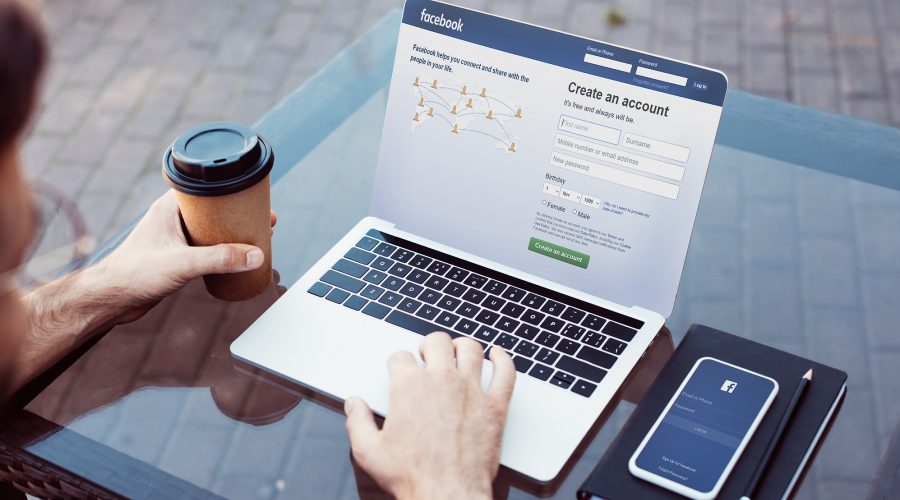Facebook stress: the social network controls you through dopamine
Have you ever heard about something called Facebook stress? Checking Facebook when waking up and before sleeping has become part of the daily ritual of many people around the world. Also giving likes, writing comments and sharing content has been added to the dynamics of social interaction. But what makes this social network so addictive? The answer is dopamine.

For some, Facebook represents an extraordinary marketing platform and the possibility of instant connections that nobody would imagine 30 years ago. For others, Facebook became a way to isolate people, invade their privacy and a source of digital stress.
According to an analysis by the Mediakix agency, the average time a person spends on Facebook is 35 minutes a day. This means that by the end of your life, you will have spent 1 year and 7 months on Facebook.
However, these parameters change constantly as the number of users of social networks increases worldwide. It is estimated that a teenager can spend up to 2.7 hours a day dedicated to interaction on social networks.
More alarming is the fact that if you add the time you spend on Facebook with the time you spend on Youtube, Instagram, Snapchat and Twitter, you will have spent 5 years and 4 months of your life on social networks.
What is dopamine?
Dopamine, also known as the hormone of happiness and pleasure, is a neurotransmitter present in different areas of the brain. Dopamine is important because it influences nerve responses related to emotions and motor functions.
Among other functions, dopamine is related to brain reward systems. This means that dopamine regulates pleasure sensations, motivation, and curiosity. It also influences decision making, learning, and memory.
The action of dopamine is concentrated in the Accumbens Nucleus. This area is the brain’s main pleasure center because it awakens behaviors to positive and negative emotional stimulus. Get to know more about dopamine.
What is the relationship between Facebook and dopamine?
When Mark Zuckerberg launched the first version of Facebook, he probably never thought that years later, his social network would become a dopamine factory to capture users.
According to Chamath Palihapitiya, former vice president of Facebook, the social network was designed to create repetitive cycles dominated by dopamine.
And how did they do it? Simple, by placing hearts, likes, emoticons, thumbs up, etc. According to one of the Facebook founders, Sean Parker, the main question they asked themselves to attract people to the social network was: how can we consume others’ time and attention as much as possible? That’s how the “like” came up.
For Parker, this small dose of dopamine would be able to generate addiction to the social network slowly. It was expected (and so it happened) that users were captured by the “like”. This reward was introduced as the representation of the acceptance and social validation among Facebook users.
With more than 125 million user connections created since 2004, two million likes a day and one billion comments, Facebook continues to be the most influential and attractive social network for Internet users.
Then, Facebook began to play with what is called gregarious sense. This is when you perceive yourself as part of a social group and at the same time, you feel accepted, listened to, valued, etc.
Continuing with Parker´s opinion, Facebook changed the relationship of individuals with society and thinks that perhaps, this social network interferes with productivity in perverse ways. He even points out that he does not know exactly what Facebook is actually doing to children’s brains.
The Facebook isolation
According to Polish sociologist Zygmunt Bauman, Zuckerberg’s success was to realize that our worst nightmare is to be abandoned, to face loneliness, and lose the connection with the life around us.
For Bauman, social networks have changed the sense of identity and community. According to Bauman, the difference between network and community is that you belong to the community but the network belongs to you.
You can add friends and delete them at the same time with a few clicks. You control the people with whom you relate so easily, that you do not need any social skills.
Little by little, people lose their ability to interact with their families, on the street, in their work centers. It is more difficult to dialogue and everything becomes a kind of sofa activism.
What is Facebook stress
According to Psychology Today, the fact that Facebook users can share sad stories or difficult moments in their lives aims to get spectators to secrete oxytocin.
Oxytocin, or love hormone, stimulate empathy and generosity, which generates reactions of solidarity and help. When a person feels supported by others in times of crisis, the pain caused by cortisol, the stress hormone, is reduced.
In this way, Facebook deceives your brain and makes you believe that your loved ones are present to help. The deception is possible because the human brain often fails to recognize the difference between images and real people. Why? Because our brain evolved thousands of years before photography.
However, this continuous exposure to the exchange of dopamine and oxytocin is capable of producing addiction. And as it happens with all addictions, the brain asks for more. This dependence can generate Facebook stress when what the social network offers is not enough to cover other gaps in life.
Distortion of reality
Facebook stress is also reinforced by the fact that users begin to perceive reality through images. This produces an effect similar to Plato´s Allegory of the Cave: our senses begin to interpret life outside the context of reality.
By constantly seeing edited images of men and women apparently having a luxurious and happy life among cars, trips, yachts and perfect bodies; happy families having the best holidays, or good-looking couples without difficulties, it usually triggers states of longing, depression, and frustration in people who compare their life with the ideal state of the things they see on Facebook or other social networks like Instagram.

Facebook stress also reinforced the idea that all the people that have not achieved their goals or dreams are losers compared to those who present themselves as successful people in pictures.
But who has achieved everything? Who is perfect? Who can say they never failed? No one. However, Facebook has the ability to manipulate reality through dopamine and oxytocin.
By the end of your life, you will have spent 1 year and 7 months on Facebook.
Those people that were once essential in the Facebook structure, such as Sean Parker and Chamath Palihapitiya, nowadays are dedicated to warn users about the effects of Facebook stress and recommend reducing the time invested in this social network.
It is also true that Facebook is not bad at all and has a good face. Many good causes and social movements had a greater projection thanks to social networks.
Users have broken traditional information fences controlled by governments through television or radio. Also, Facebook has been used as a platform to find people in cases of emergency and launch humanitarian alerts.
All this is good, the problem is when social networks become essential in our interaction with other people and transform our perception. What do you think? Have you suffered Facebook stress? Leave us a comment!



